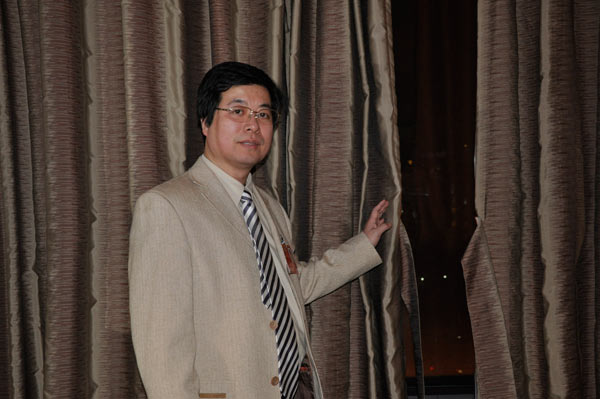
|
 |
|
Cao Kan says the use of low emission insulation windows can help improve energy efficiency. [Photo by Uking Sun/chinadaily.com.cn]
|
Cao Kan, an overseas Chinese representative invited to observe the nation's top political advisory body, has, urged the government to aggressively promote energy efficient buildings.
Cao, chairman of the board of Nordic Group Holding AS, has worked in real estate development and construction in Norway for more than 20 years. He said China boasts the world's largest construction market, with more than 40 billion square meters of existing construction area and a sustained construction growth of 2 billion square meters per year.
Cao, who was attending the First Session of the 12th National Committee of the Chinese People's Political Consultative Conference (CPPCC), foresees vast opportunities for China to improve energy efficiency in buildings amid pressing efforts to cut CO2 emissions.
Buildings account for 30 percent of the country's total electricity consumption, about 1.5 trillion kilowatt-hour (kwh) a year. A moderate energy preservation of even 10 percent of the buildings, 4 billion square meters, is projected to decrease energy consumption by 75 percent, nearly 112.5 billion kwh, according to Cao.
For the new buildings measuring 2 billion square meters, if only 50 percent adopts "general measures" for thermal insulation, it c save 140.6 billion kwh in five years. Those measures include adding an insulation coating layer of 10cm to the walls, roofs and floors in the basement and use low-emissivity insulating windows.
"The total amount of electricity saved through the two approaches is equivalent to the output of two and a half Three Gorges power plants," Cao said. The plant, China's largest hydropower project, generated 98.1 billion kwh of electricity in 2012, Xinhua reported.
Cao said Norway has a well-established legal system to guide building construction, ranging from noise-proofing, energy efficiency to indoor air quality. He urged China to improve laws, review national standards and supervision to ensure energy efficiency of buildings.
Priority should be placed on public building, which accounts for a small percent of building areas but a large percent of electricity consumption, he added.
For the potential costs in improving old buildings to be more energy-efficient, Cao suggested the government provide financial policy support to real estate developers or subsidies to house purchasers. Passive house, which means an ultra-low energy building that requires little energy consumption for heating or cooling, should also be built in China's different regions to obtain the experience needed for future large scale operations.
Cao emphasized that public awareness of energy efficiency of buildings is strikingly low in China, both among property developers and consumers, when compared with Norway.
"Few people realize that it is neither high-technology nor huge investment needed to make a big difference of building energy efficiency."
The 18th National Congress of the Communist Party of China (CPC) advocated the idea of building a "beautiful China" with wide public discourse of the "China Dream" too, and my dream certainly includes a blue sky, Cao said.







